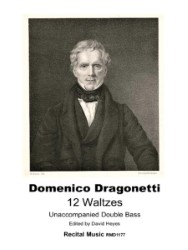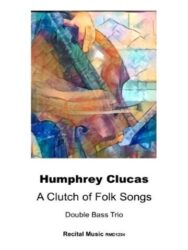Celebrations Book 10 is a collection of three pieces (Osborne Variations, Preludes and Nocturnes, Solo Partita) by Armand Russell for solo double bass.
Celebrations Book 10 is a collection of three pieces (Osborne Variations, Preludes and Nocturnes, Solo Partita) by Armand Russell for solo double bass.
1) Osborne Variations
This work is called Variations since the overall approach to the form is akin to a theme with a series of sections that are related to the theme, however these variations employ a wide assortment of methods to connect with the theme including many different melodic and harmonic linkages.
Osborne refers to the composer and double bass player Tony Osborne (1947-2019) in whose memory the work is written. His name has eleven letters which are converted from his name to a melodic theme. A method was devised to convert these letters, TONYOSBORNE, into a series of pitches that are used for the initial appearance of the central theme of the work. Some of the pitches are repeated in different octaves in the initial statement to enhance the melodic contour.
The purpose in using this conversion for the basic theme, which permeates the whole work in diverse ways, is to make the memory of Tony an integral influence on the essence of the work.
2) Preludes & Nocturnes
This work is dedicated to David Heyes who indefatigably supports new music for the double bass.
Preludes & Nocturnes consists of five brief movements each with a descriptive adjective. The Preludes are the first, middle and last movements. A touch of irony is suggested in that the last movement is a Prelude. The two Nocturnes are written to imply three voices by the one, solo double bass. These tranquil and restive Nocturnes are expressive and somewhat slower by comparison with the assertive, capricious and whimsical Preludes. Each movement lasts approximately one minute in length and they may be performed separately or in various combinations at the performers discretion.
3) Solo Partita: 1. Prelude 2. Allemande 3. Sarabande 4. Bourree 5. Gigue
The Solo Partita was inspired by Baroque models, the solo cello suites of J.S. Bach in particular. As a “neo-baroque” suite it contains three of the standard movements, Allemande, Sarabande and Gigue and two additional movements, a Prelude and a Bourree.
Programme notes by Armand Russell





